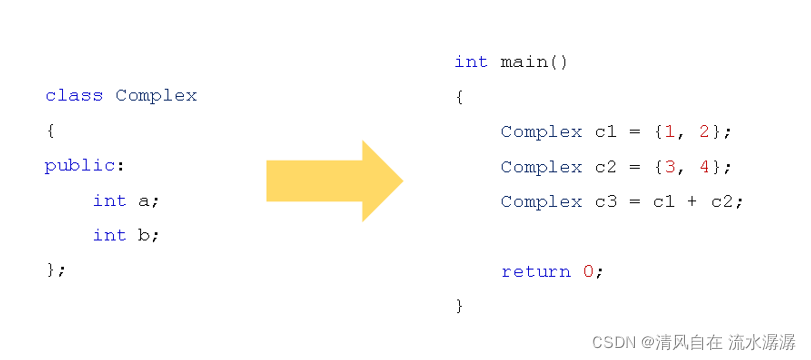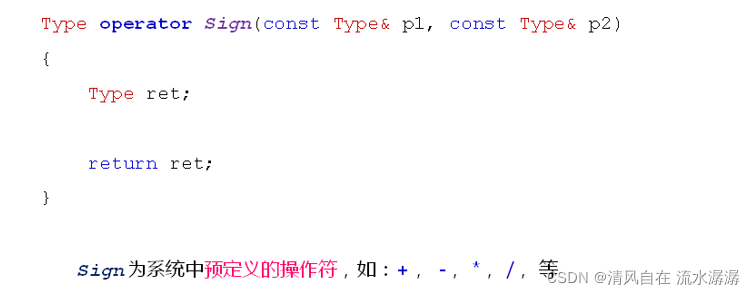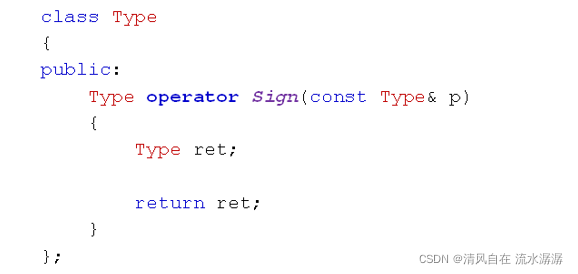C++操作符重载
清风自在 流水潺潺 人气:0一、需要解决的问题
下面的复数解决方案是否可行?

下面看一下复数的加法操作:
#include <stdio.h>
class Complex
{
int a;
int b;
public:
Complex(int a = 0, int b = 0)
{
this->a = a;
this->b = b;
}
int getA()
{
return a;
}
int getB()
{
return b;
}
friend Complex Add(const Complex& p1, const Complex& p2);
};
Complex Add(const Complex& p1, const Complex& p2)
{
Complex ret;
ret.a = p1.a + p2.a;
ret.b = p1.b + p2.b;
return ret;
}
int main()
{
Complex c1(1, 2);
Complex c2(3, 4);
Complex c3 = Add(c1, c2); // c1 + c2
printf("c3.a = %d, c3.b = %d\n", c3.getA(), c3.getB());
return 0;
}输出结果如下:

思考
Add 函数可以解决 Complex 对象相加的问题,但是 Complex 是现实世界中确实存在的复数,并且复数在数学中的地位和普通的实数相同。
为什么不能让+操作符也支持复数相加呢?这个就涉及到操作符的重载。
二、操作符重载
C++ 中的重载能够扩展操作符的功能
操作符的重载以函数的方式进行
本质
用特殊形式的函数扩展操作符的功能
- 通过 operator 关键字可以定义特殊的函数
- operator 的本质是通过函数重载操作符
语法

下面来初探一下操作符重载:
#include <stdio.h>
class Complex
{
int a;
int b;
public:
Complex(int a = 0, int b = 0)
{
this->a = a;
this->b = b;
}
int getA()
{
return a;
}
int getB()
{
return b;
}
friend Complex operator + (const Complex& p1, const Complex& p2);
};
Complex operator + (const Complex& p1, const Complex& p2)
{
Complex ret;
ret.a = p1.a + p2.a;
ret.b = p1.b + p2.b;
return ret;
}
int main()
{
Complex c1(1, 2);
Complex c2(3, 4);
Complex c3 = c1 + c2; // operator + (c1, c2)
printf("c3.a = %d, c3.b = %d\n", c3.getA(), c3.getB());
return 0;
}输出结果如下:

可以将操作符重载函数定义为类的成员函数
- 比全局操作符重载函数少—个参数(左操作数)
- 不需要依赖友元就可以完成操作符重载
- 编译器优先在成员函数中寻找操作符重载函数

下面来实现在成员函数中重载操作符:
#include <stdio.h>
class Complex
{
int a;
int b;
public:
Complex(int a = 0, int b = 0)
{
this->a = a;
this->b = b;
}
int getA()
{
return a;
}
int getB()
{
return b;
}
Complex operator + (const Complex& p)
{
Complex ret;
printf("Complex operator + (const Complex& p)\n");
ret.a = this->a + p.a;
ret.b = this->b + p.b;
return ret;
}
friend Complex operator + (const Complex& p1, const Complex& p2);
};
Complex operator + (const Complex& p1, const Complex& p2)
{
Complex ret;
printf("Complex operator + (const Complex& p1, const Complex& p2)\n");
ret.a = p1.a + p2.a;
ret.b = p1.b + p2.b;
return ret;
}
int main()
{
Complex c1(1, 2);
Complex c2(3, 4);
Complex c3 = c1 + c2; // c1.operator + (c2)
printf("c3.a = %d, c3.b = %d\n", c3.getA(), c3.getB());
return 0;
}输出结果如下:

这个说明编译器优先在成员函数中寻找操作符重载函数
故上述代码可以直接写成:
#include <stdio.h>
class Complex
{
int a;
int b;
public:
Complex(int a = 0, int b = 0)
{
this->a = a;
this->b = b;
}
int getA()
{
return a;
}
int getB()
{
return b;
}
Complex operator + (const Complex& p)
{
Complex ret;
ret.a = this->a + p.a;
ret.b = this->b + p.b;
return ret;
}
};
int main()
{
Complex c1(1, 2);
Complex c2(3, 4);
Complex c3 = c1 + c2; // c1.operator + (c2)
printf("c3.a = %d, c3.b = %d\n", c3.getA(), c3.getB());
return 0;
}三、小结
- 操作符重载是 C++ 的强大特性之一
- 操作符重载的本质是通过函数扩展操作符的功能
- operator 关键字是实现操作符重载的关键
- 操作符重载遵循相同的函数重载规则
- 全局函数和成员函数都可以实现对操作符的重载
加载全部内容